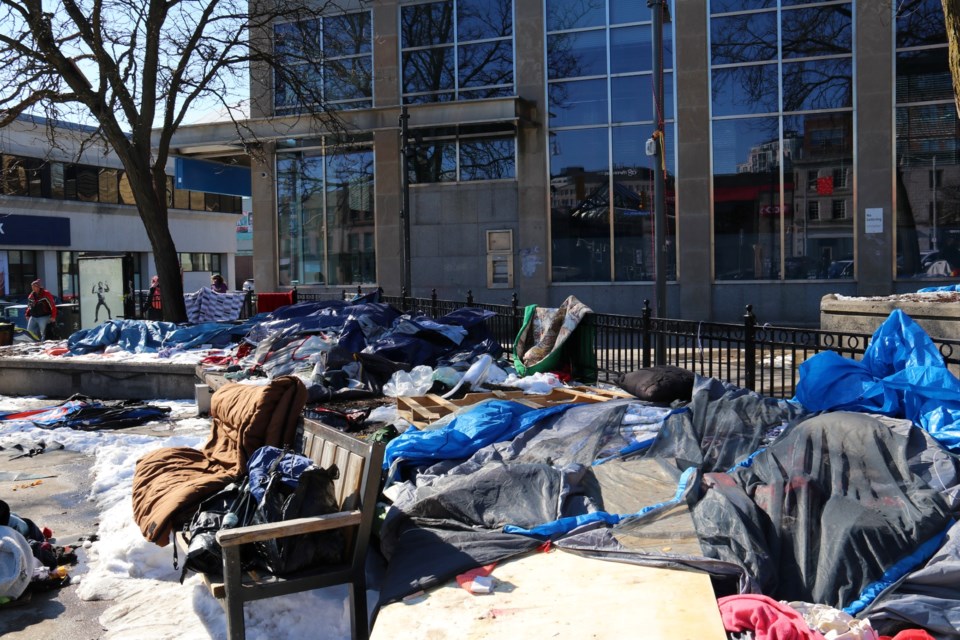The sizeable encampment in St. George’s Square is going to look a little smaller, as most of its residents began packing up their belongings this week.
Most of them have been temporarily moved into a Guelph hotel, said Jeff Dillon, one of the residents taking down his tent.
Earlier this month, the County of Wellington announced $633,000 in funding from the federal government to help shelter people experiencing homelessness during the winter months. With that, several unhoused people in the community have been offered temporary rooms at the former Holiday Inn Express and a second Guelph hotel.
“I’m happy about it,” Dillion said of the chance to stay at the hotel for a month. “But it’s only a matter of time before it comes to an end. I’d be a lot happier if I knew exactly what was gonna happen when the funding runs out.”
In the meantime, he’s doing his best to keep looking for a place to live, but it’s no easy task with one-bedroom apartments averaging at around $1,979 a month.
He and his friend were the first to set up in the square, he said, choosing the location for its visibility, “to make a statement and be noticed.”
“They can’t just brush (homelessness) under the rug like they’ve been doing,” he said.
Dillon said as far as he knows, everyone who was living in the square for the last few months has been placed in a hotel room, except for one person who declined the offer.
“I’m just waiting for the bad news. It happens every time,” Dillon said. “You gotta think ahead living this lifestyle.”
There will likely be at least two tents still standing by the end of the day though, as someone new moved their tent into the square while the rest were taking their things down.
Greg Dorval, who was sleeping in a tent behind the courthouse in protest, is also moving his tent to the square, saying he’s made enough of a statement to the county, and wants to put more pressure on the city to address homelessness.
Jason Hartung was among those helping to clean up the encampment.
Hartung wasn’t living there, but has been homeless for the last several months since being evicted from 90 Carden, where he had lived for nine years. Like Dillon, he's staying in a hotel for the next month after being offered a spot from the County.
“I want to help the community as much as I can,” he said about helping clean up the encampment. Plus, he said he feels responsible for helping clean, since he provided everyone there with tarps and heaters.
In the year prior to losing his apartment, Hartung spent six months in jail and another six in rehab, ensuring his rent was paid the whole time. It wasn’t until he left rehab that he discovered the building had been bought by new owners, and he no longer had a place to live.
“I’m clean, I’m all happy, I’m going back to my apartment. I get home, there’s no apartment, and treatment was a failure for me,” he said, because he relapsed after learning he had no home to go to.
“All of us have the same kind of story,” he said. “We were all in 90 Carden. Some of them might not have been there by lease, but they were there,” he said.
For instance, he said his apartment helped keep “another six people off the streets," since he would let people stay over.
“I can’t sleep at night knowing that there are people out here. Cold is the worst feeling,” he said, adding that a friend of his got frostbite on the tips of his fingers just a few days ago.
While Hartung is grateful for the temporary shelter, he hopes the county will find housing for him and others before the funding runs out.
“I don’t want to be on the streets,” he said.
